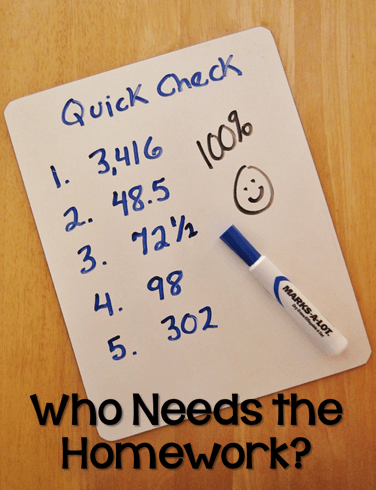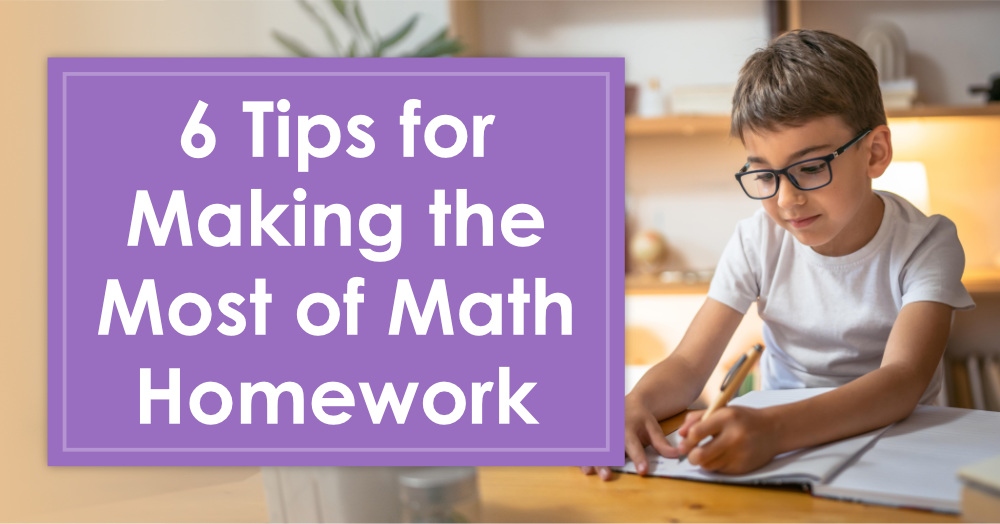Is homework effective? Educators seem to be evenly split on this question. Some insist that homework is essential because students need to review and practice skills at home. Others argue that it’s a waste of time and a burden on families, especially when some parents are not willing or able to help with homework. Even worse, some parents who genuinely want to help may teach the skill incorrectly, causing you to have to reteach it the next day.
6 Tips for Making the Most of Math Homework
Personally, I feel that homework can be very effective, especially in math, if you keep these tips in mind:
- Before assigning homework, make sure the majority of your students are at least somewhat proficient with the skill so they can experience success at home.
- Keep homework assignments short and to the point. Why assign 30 problems if all they need is 5?
- Only assign homework to those who need it. If a student has mastered a skill with 100% accuracy, why should he or she have to do the homework? Use the Quick Check formative assessment strategy described below to find out who needs additional practice and who doesn’t.
- Only assign homework to those who will benefit from it. If they don’t have a clue about how to complete the problems, homework on that skill is a waste of time. Furthermore, the resulting feelings of frustration can negatively impact the way students feel about math. Instead, differentiate the assignment by giving those students something easier or deferring the assignment until after they receive more help at school.
- Consider the level of parent support and your students’ home environments. If the majority of them will not be able to get help at home, and are more worried about where their next meal is coming from than the day’s assignment, you may want to greatly reduce the homework load.
- Rather than collecting homework and grading it, simply check off whether or not the student attempted ALL problems. Start each class period with a review and discussion of the previous day’s work. Expect students to be able to explain HOW they solved their problems, and don’t give them credit for the work if they can’t explain it.
Quick Check Formative Assessments
You might be wondering how to figure out which kids will benefit from the homework assignment. It’s actually a pretty simple task if your students have dry erase boards. If they don’t, you can substitute quarter sheets of scrap paper. At the end of each class, do a 5-minute Quick Check. This formative assessment will help you decide who needs extra practice on the concept or skill you taught that day.
Instead of assigning homework to everyone, announce that anyone who scores 100% on the Quick Check won’t have homework that day!

Here’s how to do a Quick Check:
- Post four or five problems on a flip chart or on the board.
- Ask students to work the problems out on paper and transfer their answers to a dry erase board. If they are seated close together, have them put up barriers like notebooks or folders for privacy.
- Tell your students that they will have only ONE chance to show you their boards and try to earn their way out of the homework assignment. If they make even one careless error, they will have to complete the homework! Stick to your guns on this one!
- Ask students flip their dry erase boards face down when they are ready for you to check answers.
- Walk around the room with a checklist, and quickly peek at each board. Write the score on the student’s board and record it on your student checklist. Keep this list so you can refer to it the next day when checking off homework.
- Give your students a reasonable amount of time for the work, but there’s no need to wait until all children finish. If it takes them a long time, they need more practice at home.
- After most students are finished, review the assignment and discuss each problem so students understand the ones they missed.
- Post the homework assignment, and be sure the students who scored 100% know they are excused from doing the work.
Quick Check Benefits
Quick Checks are tremendously motivating for students. They encourage kids to do their very best work by providing an incentive to eliminate careless errors. These short formative assessments keep you in touch with how the class as a whole is doing as well as how individual students are grasping the concept. Based on what you see on the boards, you may decide not to assign any homework at all because too many students are still struggling with the concept.Someone once told me that the saying, “Practice makes perfect,” isn’t completely correct. If you practice something incorrectly, it’s worse than not practicing at all! Only perfect practice makes perfect! To make the most of math homework, only assign it to those who will benefit from it, and expect your students to be able to justify their answers in your homework review session.
More Bright Ideas for Teachers
This post is one of 150 Bright Ideas blog posts in a huge link up! Take a look at the terrific topics below and click any link for another bright idea! You can also find these posts on the Bright Ideas Pinterest board which has hundreds of fantastic posts!








